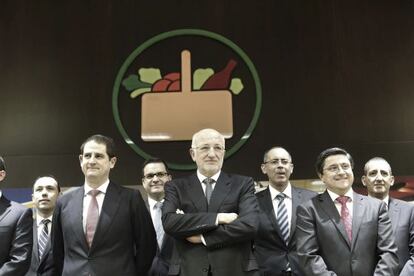Supermarket success story Mercadona sees slight decline in sales
Company was viewed as a business survivor during the toughest years of the crisis


After two years of robust growth, sales at Mercadona – Spain’s largest supermarket chain – appear to be tapering off.
During the crisis, Mercadona was considered a prime example of a business survivor, undergoing an unprecedented expansion of 1,467 stores throughout the country, and new hires during 2011 and 2012 of an estimated 10,000 employees, boosting its workforce to its current level of 74,000.
In the middle of this boom, Mercadona chairman Juan Roig once told reporters that “Spain was a wasteful country,” and should mimic the “hardworking culture” of the Chinese. It was colorful quips such as this that journalists were hoping for when they met with Roig to go over his company’s results.
But on Thursday, the chairman of the multi-billion-euro enterprise wasn’t so cocksure. Mercadona did grow last year by 2.9 percent, taking in more than 18 billion euros of revenues, but it was the lowest figure the food and retail chain has posted since 2009.
If we have to dance sevillanas to sell, Mercadona will dance sevillanas,” said Roig
When presenting his company’s results to reporters in Valencia, Roig was restrained. He acknowledged that Mercadona was working to maintain its business despite the still-lethargic economy.
“If we have to dance sevillanas to sell, Mercadona will dance sevillanas,” he said, in reference to the popular folk dance from Seville.
Despite the sluggish figures, company officials are “very satisfied” because they expected a decline in profits. The giant chain opened 61 new stores last year – but closed five – and invested 650 million euros.
In terms of jobs, Roig reported that no new positions had been created. “The workforce remained stable at 74,000 employees. In 2011 and 2012, 10,000 people were hired as part of a fresh new strategy,” he said. Nevertheless that number of workers, he explained, is sufficient to fill positions at the 60 new stores that the company plans on opening this year, with investment of 700 million euros. “If there is demand, we will create new jobs. But we don’t foresee this in 2014.”
As is customary, Roig underscored the high salaries of his employees. The average worker who has been with the company for four years (64,000 of the current 74,000) will rise this year to a net 1,400 euros a month with added benefits.
“We pay high salaries but we demand more,” Roig said, in comparing what other supermarkets pay while adding that productivity has also risen by six percent. “We are a high-performance company. You have to pay your workers well and treat them well because our workers put in that extra effort.”
Tu suscripción se está usando en otro dispositivo
¿Quieres añadir otro usuario a tu suscripción?
Si continúas leyendo en este dispositivo, no se podrá leer en el otro.
FlechaTu suscripción se está usando en otro dispositivo y solo puedes acceder a EL PAÍS desde un dispositivo a la vez.
Si quieres compartir tu cuenta, cambia tu suscripción a la modalidad Premium, así podrás añadir otro usuario. Cada uno accederá con su propia cuenta de email, lo que os permitirá personalizar vuestra experiencia en EL PAÍS.
¿Tienes una suscripción de empresa? Accede aquí para contratar más cuentas.
En el caso de no saber quién está usando tu cuenta, te recomendamos cambiar tu contraseña aquí.
Si decides continuar compartiendo tu cuenta, este mensaje se mostrará en tu dispositivo y en el de la otra persona que está usando tu cuenta de forma indefinida, afectando a tu experiencia de lectura. Puedes consultar aquí los términos y condiciones de la suscripción digital.








































